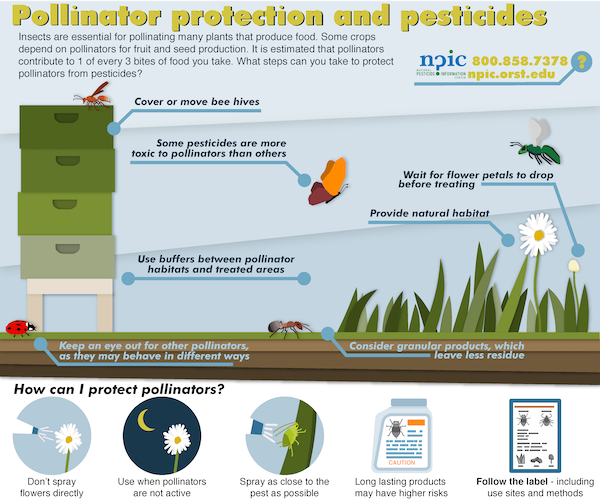1.800.858.7378npic@oregonstate.edu
Call, email, or chat Mon-Fri
A to Z

Many plants benefit from pollinators. Some, like almonds trees, are dependent on them to reproduce. Pollinators are attracted to nectar or pollen. As the pollinator goes from flower to flower, they help plants reproduce, providing us with fruits, vegetables, and nuts. There are many different species of pollinators, including the well-known honey bees, bumble bees, butterflies, and hummingbirds, and the lesser known bats, lizards, flies, and beetles.
- Most insecticides can hurt bees and butterflies. Minimize the need for insecticides by tolerating harmless pests and trying alternative methods first.
- Create habitat for pollinators by making your landscape complex, with a variety of plant types, ground cover, and refuge areas.
 |
How can you protect pollinators when using pesticides?
- Do not spray flowers directly.
- Do not spray while pollinators are active. Spraying in the evening, after bees have returned to their hives, allows for spray residues to dry overnight.
- Always follow the label directions when applying a pesticide product. Pay special attention to the “Environmental Hazards” section of the label.
- Consider using granules rather than liquids. Granules are less likely to leave residue on plant surfaces.
- Apply as close as possible to the target pest to minimize pesticide drift.
- Treating trees that may attract bees while they are in bloom can create a lethal situation for honeybees and other pollinators.
- Honeybees and other pollinators need water. Keep in mind some products intended to kill mosquitoes in birdbaths can be toxic to pollinating insects.
- Consider using native plants. They often require less maintenance and pesticide use.
- Learn about Extended Residual Activity (ERT or RT), the amount of time residue may be expected to be harmful to bees. Look up your active ingredient in this publication to learn more.
Additional Resources:
Bees and other pollinators
- How to control invasive pests while protecting pollinators and other beneficial insects - Michigan State University Extension
- BEE Careful with Pesticides! (infographic) - U.S. Environmental Protection Agency (EPA)
- How to Reduce Bee Poisoning from Pesticides - Pacific Northwest Extension
- Protecting Bees and Other Pollinators from Pesticides - EPA
- Pollinator Protection: Report Bee Kills - EPA
- Residual Time to 25% Bee Mortality (RT25) Data - EPA
- Bee Precaution Pesticide Ratings - University of California
- Gardening and Landscaping Practices for Nesting Native Bees - Utah State University Extension
- Bumble Bee Conservation – Xerces Society
- Minimizing Pesticide Risk to Bees in Fruit Crops – Michigan State University Extension
Pollinator Conservation
- Protect Pollinators: Read the label - Pollinator Partnership
- Pollinators - USDA Forest Services
- Pollinator-Friendly Parks - Xerces Society
- Reduce the Risk of Pesticides to Pollinators - Solve Pest Problems, Oregon State University
- Protecting Pollinators from Pesticides - University of Georgia, Honey Bee Program
- Finding Pollinator Attractive Plants - Rutgers University
- Pollinator Friendly Vector Control - Pollinator Partnership
- Pesticide Applicator Best Management Practices – Pesticide Environmental Stewardship
- Managed Pollinator Protection Plan Resources - Honeybee Health Coalition
- Pollinator Conservation: Gardens – Xerces Society
- Roadside Best Management Practices that Benefit Pollinators - US Department of Transportation, Federal Highway Administration
- 2019 Pollinator Best Management Practices Booklet - North Central IPM Center
- 12 plants to entice pollinators to your garden – Oregon State University Extension
- Management of Turfgrass Insect Pests and Pollinator Protection – University of Georgia Extension
- Backyard Pollinators – Cornell University
- Pollinator Protection Outreach Materials - Association of American Pesticide Control Officials
If you have questions about this, or any pesticide-related topic, please call NPIC at 800-858-7378, or email at npic@ace.orst.edu.
Last updated June 20, 2024
